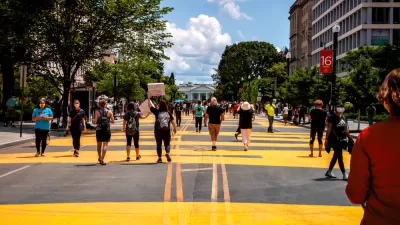Planners in Washington D.C. are bracing for the arrival of millions of visitors for President Obama's inauguration -- which they expect will overwhelm the parking supply and the public transit system.
"More than a month before Obama is sworn in, D.C. is in the grips of inaugural madness. The mayor suspended all the usual rules for property rentals for the week (and won't charge local taxes on any rental revenue), setting up a legal free-for-all on the housing front. Planners are freaking out about what to do with an estimated 10,000 buses that will ferry people into the city for the ceremony (enough, if lined up end-to-end, to circle the entire Capital Beltway); there's nowhere to park them all, and not many good ways to get people from wherever they park to the inauguration. The folks who run the Metro system are basically just giving up -- they want anyone who's coming from less than two miles away to walk.
When public transportation officials start telling people not to take public transportation, you know things are getting weird.
Still, the Obama mania seems to be going well past anything the city has experienced before. Officials working for Obama's inauguration committee, which handles the parade and the fanciest parties, say they're confident the city will be ready to handle whatever happens next month. But if anything close to 4 million people turn up -- about seven times the city's population -- it's hard to figure out exactly how it could all go according to plan. By the time Jan. 20 actually gets here, D.C. may be completely crazed."
FULL STORY: Obama mania grips the capital

Alabama: Trump Terminates Settlements for Black Communities Harmed By Raw Sewage
Trump deemed the landmark civil rights agreement “illegal DEI and environmental justice policy.”

Planetizen Federal Action Tracker
A weekly monitor of how Trump’s orders and actions are impacting planners and planning in America.

The 120 Year Old Tiny Home Villages That Sheltered San Francisco’s Earthquake Refugees
More than a century ago, San Francisco mobilized to house thousands of residents displaced by the 1906 earthquake. Could their strategy offer a model for the present?

In Both Crashes and Crime, Public Transportation is Far Safer than Driving
Contrary to popular assumptions, public transportation has far lower crash and crime rates than automobile travel. For safer communities, improve and encourage transit travel.

Report: Zoning Reforms Should Complement Nashville’s Ambitious Transit Plan
Without reform, restrictive zoning codes will limit the impact of the city’s planned transit expansion and could exclude some of the residents who depend on transit the most.

Judge Orders Release of Frozen IRA, IIJA Funding
The decision is a victory for environmental groups who charged that freezing funds for critical infrastructure and disaster response programs caused “real and irreparable harm” to communities.
Urban Design for Planners 1: Software Tools
This six-course series explores essential urban design concepts using open source software and equips planners with the tools they need to participate fully in the urban design process.
Planning for Universal Design
Learn the tools for implementing Universal Design in planning regulations.
Clanton & Associates, Inc.
Jessamine County Fiscal Court
Institute for Housing and Urban Development Studies (IHS)
City of Grandview
Harvard GSD Executive Education
Toledo-Lucas County Plan Commissions
Salt Lake City
NYU Wagner Graduate School of Public Service





























